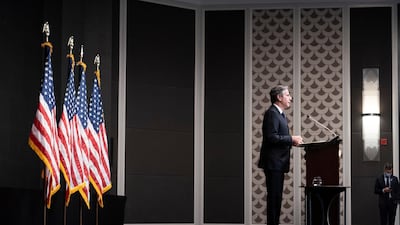In the wake of the latest deadly outbreak of fighting between Israel and the Palestinians, US President Joe Biden has declared that one of his main policy goals is to address Washington’s “years of neglect” of the Palestinian cause in recent years.
To this end, Mr Biden this week sent his Secretary of State, Antony Blinken, on a hastily arranged diplomatic mission to the region to explore how Washington could assist with Palestinian reconstruction after Israel’s devastating aerial assault.
The White House also intends to revive peace Palestinian-Israeli peace efforts.
"I believe the Palestinians and Israelis equally deserve to live safely and securely, and enjoy equal measures of freedom, prosperity and democracy," Mr Biden said. "My administration will continue our quiet and relentless diplomacy towards that end."
Mr Blinken’s four-day trip, which ended on Thursday, included stops in Jerusalem, Ramallah, Cairo and Amman as he sought to build on the success of the Egyptian-led diplomatic initiative that resulted in last week’s ceasefire.
His trip took place amid a marked increase in diplomatic activity in the region, with British Foreign Secretary Dominic Raab making a one-day visit to meet Israeli Prime Minister Benjamin Netanyahu and the Palestinian Authority this week.
After Mr Netanyahu praised British Prime Minister Boris Johnson’s “staunch and unwavering” support for Israel, Mr Raab reaffirmed Britain’s commitment to making “genuine progress towards a more positive future for both Israelis and Palestinians”.
During his mission, Mr Blinken’s top priority was to ensure that the ceasefire holds and that there is no resumption of the violence that resulted in 11 days of intense fighting between Israel and the Palestinians, in which 12 Israelis including two children died and 248 Palestinians, including 39 women and 66 children, were killed by Israeli attacks on Gaza.
But in achieving his aims of making sure the ceasefire holds and fulfilling Mr Biden’s pledge to build better relations with the Palestinians, Mr Blinken clearly has a number of significant challenges to overcome, not least of which is the Biden administration’s complex relationship with Israel.
Mr Biden has been at pains to stress Washington’s continuing commitment to Israel, saying one of Mr Blinken’s first priorities was to reassure Israeli leaders about Washington’s “ironclad commitment to Israel’s security”.
Despite calls from left-wing Democrats for the US to halt arms sales to Israel, Mr Biden has promised to help it strengthen the Iron Dome air defence system that proved to be so effective in intercepting many of the estimated 4,000 rockets that were fired by Hamas militants during the latest conflict.
But by re-emphasising the strength of Washington’s commitment to Israel, Mr Biden will have caused unease among Palestinian leaders, who are still to be convinced that the new administration is genuine about ending the “years of neglect” in relations between Washington and the Palestinians.
The principal cause of the most recent fall-out between the US and Palestinian leader Mahmoud Abbas was the decision made by former president Donald Trump in 2017 to relocate the American embassy from Tel Aviv to Jerusalem.
The Palestinian leadership responded by breaking ties with the Trump administration, with the result that they were largely sidelined in the intensive diplomatic initiative that resulted in the ground-breaking Abraham Accords.
And the isolation of Mr Abbas’s more moderate Fatah wing in Palestinian politics has played into the hands of the extremist militant group Hamas, which rejects the progress made in the Abraham Accords and escalated the latest round of clashes with Israel.
Many observers believe Hamas deliberately made worse the violence as a means of boosting its Palestinian leadership credentials.
Hamas was expected to win the latest round of Palestinian elections before they were cancelled by Mr Abbas at the end of April, and the prominent role it played in the recent fighting against Israel may have boosted its support base in both Gaza and the Israeli-occupied West Bank.
Consequently, the other major challenge Mr Blinken faced as he undertook his mission in the region was to find a means of providing tangible help for the Palestinians without having any engagement with Hamas, which Washington regards as a terrorist organisation.
Mr Biden acknowledged the scale of the challenge when he announced that Washington would work with the UN and others to provide humanitarian assistance to the people of Gaza.
He said he would do this in partnership with the Palestinian Authority "in a manner that does not permit Hamas to simply restock its military arsenal".
This is easier said than done, as Hamas is by far the dominant force in Gaza and, together with its Iranian backers, has shown little interest in engaging in a constructive dialogue.
Nevertheless, Mr Blinken’s mission appears to have ended on a positive note, with the US envoy winning diplomatic support and aid pledges from Arab allies.
One of the more positive outcomes of the mission was the Biden administration’s plan to reopen the US consulate in Jerusalem as representation to the Palestinians.
That should help to improve Washington’s ties with the Palestinian leadership, and drew praise from Jordan's King Abdullah when he met Mr Blinken in Amman.
There was also a marked improvement in relations between Egypt and the US after Mr Blinken visited Cairo, where he praised the Egyptian role in securing a ceasefire between Israel and Hamas.
Mr Blinken said Egypt was a “real and effective partner” after meeting President Abdel Fattah El Sisi and his Foreign Minister, Sameh Shoukry.
Yet while Mr Blinken’s mission, in terms of his efforts to shore up the Gaza ceasefire, can be deemed a success, his ambition to help the Palestinians with their reconstruction of Gaza may prove, thanks to the continued opposition of Hamas, to be far more problematic.
Con Coughlin is a defence and foreign affairs columnist for The National


